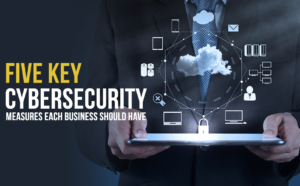 Once upon a time, cybersecurity was a concept we mostly experienced through political thrillers and sci-fi blockbusters. But now it’s a real threat that everyday businesses need to consider for protecting their data as well as sensitive client information. Thankfully, we also live in an era where you can readily prepare yourself for these worst case scenarios. Here are five different measures you can take to protect yourself from cyber threats.
Once upon a time, cybersecurity was a concept we mostly experienced through political thrillers and sci-fi blockbusters. But now it’s a real threat that everyday businesses need to consider for protecting their data as well as sensitive client information. Thankfully, we also live in an era where you can readily prepare yourself for these worst case scenarios. Here are five different measures you can take to protect yourself from cyber threats.
Firewall
No, we’re not talking about the 2006 Harrison Ford cyber-thriller Firewall. Firewall software is your first form of defense on security breaches. It works sort of like how it sounds; building a mighty barrier around your computer that filters out bad coding and hackers. Without a firewall, you’d be in big trouble. But having a lackluster firewall could be almost as bad. Investing in quality software like Comodo Internet Security Plus or Kaspersky Internet Security gives you an added advantage against incoming attacks.
Password Manager
We’ve brought up password managers a few times now on our blog, and with good reason. Using the same password for everything is a massive security risk. Having too many passwords to remember can make you want to pull your hair out. Browser-based password managers can leave your passwords unencrypted and ready for the taking. A password manager helps alleviate these risks by letting you swap between multiple, lengthy passwords without having to memorize a single character.
Encrypted Wi-Fi
Don’t have a password on your Wi-Fi? If not, you’ll want to get on that right away. Not only does having an open Wi-Fi network allow anyone to use your internet for free (potentially slowing down your internet speed and making you liable for any illegal downloads they may do on your network), it offers a major security risk. If someone savvy enough has access to your Wi-Fi, they can access the files on your computer.
Written Cybersecurity Policy
Writing things down is so old fashioned, but it still has value. A written cybersecurity policy keeps your business accountable. It can also be an education tool for your employees; informing them on what type of practices can lead to major security breaches. Human error is always a factor, so having these guidelines define from the beginning is a huge asset.
Device Management
Taking your cybersecurity policy a step further, device management helps you enact these regulations. Device management ensures your employees follow your set policies, even with mobile devices. While trust between yourself and your workers is crucial, some actions should not be accessible due to security repercussions.
Still feeling overwhelmed? We can help. Let ISOutsource get you up to speed so you can spend less time stressing about the safety of your data and more time getting back to work.
